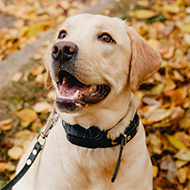
Researchers assess the efficacy of dog training with and without e-collars.
A new study has quashed the suggestion that using an electronic collar to train dogs is more efficient or results in less disobedience, even in the hands of experienced trainers.
The research, published in the journal Frontiers in Veterinary Science, assessed the efficacy of dog training with and without remote electronic collars compared to training with positive reinforcement.
Scientists found that training with positive reinforcement was more effective at addressing behaviour as well as general obedience training. They also found that positive reinforcement poses fewer risks to dog welfare and quality of the human-dog relationship.
'Given these results, we suggest that there is no evidence to indicate that E-collar training is necessary, even for its most widely cited indication,' the researchers conclude.
The findings have been welcomed by The Kennel Club, which, together with other welfare organisations and veterinary bodies, has long campaigned for a ban on the use of electric shock collars.
“These findings provide evidence that dogs can be more effectively trained without the use of electronic collars and therefore there is no place for them in dog training today,” said Holly Conway, head of public affairs at the Kennel Club. “This study proves that positive reward training is all that dogs need.
"The findings are clear and should be reviewed by the government immediately to stop the unnecessary suffering of dogs.”
The study, Efficacy of Dog Training With and Without Remote Electronic Collars vs. a Focus on Positive Reinforcement, was carried out by the Animal Behaviour, Cognition and Welfare Research Group at the University of Lincoln.



 The Animal and Plant Health Agency (APHA) has updated its online reporting service for dead wild birds.
The Animal and Plant Health Agency (APHA) has updated its online reporting service for dead wild birds.